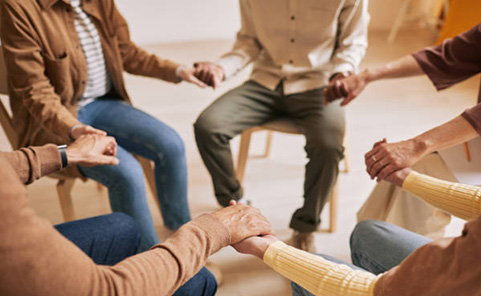Alcohol and drug dependencies introduce challenges when you or a loved one experiences them. Fortunately long term sobriety can be achieved if you adopt proven rehabilitation methods because addiction is a treatable disease.
On this page we will explain how an holistic rehabilitation program can encourage you or a loved one to begin and sustain addiction recovery.
What is Addiction Rehab (Rehabilitation)?
Addiction ‘rehabilitation’ is a broad term that describes the therapeutic and medical treatments that are used to help individuals recover from their dependencies on illegal, recreational and prescription drugs.
Treatment that is specific to your personal needs is successful when it includes medically supported detox, inpatient programs, outpatient services and aftercare.

Facts & Statistics about Addiction in Ventura
Prevalence of Substance Use Disorder, by Drug Type
(IN THOUSANDS)
- 2,7578.5%Any Substance
- 2,0886.4%Alcohol
- 1,0683.3%Ilicit Drugs
- 2060.6%Pain Medication
Drug- and Alcohol-Induced Deaths by Age Group, California, 2016
- Alcohol-Induced
- Drug-Induced
- 18 to 250.5
- 9.6
- 26 to 354.3
- 13.9
- 36 to 6424.2
- 22.9
- 65+23.7
- 9.4
Drug Use, by Selected Type and Age Group California, 2015 to 2016
- 12 to 17
- 18 to 25
- 26+
- Marijuana*13.2%
- 34.0%
- 13.5%
- Misuse of Pain Medications3.5%
- 8.0%
- 4.3%
- Cocaine0.8%
- 7.2%
- 1.8%
- Heroin0%
- 0.4%
- 0.2%
What are the treatment options available in Ventura?
A consolidated treatment approach offers a successful way to tackle the root causes of drug or alcohol use disorders. While treating the causes of addiction is necessary, you also need to build coping strategies to address the issues that lead to your drug or alcohol addiction.

Private Residential Programs
Staying at a addiction rehab center and obtaining all of your treatments there is known as a residential rehab program. The main benefit is that you will have integrated support and treatment day by day. If you leave your home and move into a rehab facility, you can remove yourself from exposure to triggers that influenced your decision to abuse drugs or alcohol.
You can complete your rehab program and avoid relapse more effectively when you remain in a controlled facility which is protective and supportive. Those who are struggling with dual diagnosis, co-occurring illnesses or extreme substance dependencies are recommended to consider an inpatient addiction treatment program.
Addiction recovery is achievable if you enroll in a residential rehab program, however if you wish to maintain sober living you are going to need to rise above the difficulties that come with the early stages of recovery. Once your inpatient program is finished you will want to be independent and your focus will be on your new life and the things you want to achieve from it.
Do You Need Help?
We work together towards sobriety.

Sober Living Programs
Sober living programs enable people in recovery build further control over their lives, with support and some guidance. These programs include:
- Round-the-clock check-ins from the house manager
- Developing guidelines to change your behavior in recovery
- Assisting you to build important relationships with peers who will share similar difficulties to you
Outpatient Programs
Outpatient treatment programs are flexible because you can continue your work or family commitments, and visit the rehab facility for treatments.
Outpatient programs offer recovery services through:
- Education on the abuse of substances
- Group therapy and individual counseling as drivers for therapeutic intervention – You must be enrolled in an outpatient program for at least three months, and may continue the program for longer than a year if required.
Detox Only Programs
The initial steps of any treatment program is a detox, which eliminates any traces of substances from your body and begins healing your physical dependency on it. Withdrawal symptoms are the body’s main response to detox, as it begins getting used to working without drugs or alcohol.
The withdrawal process symbolizes the start of the rehabilitation process, and should always be followed up by tackling the main causes of your dependency, to avoid repeating the same damaging pattern of behaviors. You may experience some cravings and withdrawal symptoms for an extended period after your drug or alcohol detox program has concluded. Relapse is less of a problem if you are equipped with the vital skills necessary to navigate your journey in recovery.
Paying for Private Treatment
Private treatment must be to be self-funded or claimed through your insurance policy. Typically, insurance companies will allow you to claim against the costs of treatment, to some extent, including a medical detox program, rehab program, and relapse prevention programs. The amount of cover offered by your policy is down to your provider and the terms and conditions of your policy.
We advise that you check to see the amount you can claim from your cover before enrolling in a rehab program. Visit our Verify Your Insurance page to learn about the cover you qualify for.
If you choose not to claim against your insurance provider, you will need to pay for your treatment. Some rehab centers may extend payment plans to clients who find the costs unaffordable upfront.
State Funded Programs
State-funded rehabilitation programs have been developed to help individuals who do not have the financial resources to deal with an alcohol or substance use disorder.
Via Medicaid and state budget funding, these programs may kickstart your recovery by including:
- Services for a safe detox (medically-supervised if required.
- Rehab treatments and extended support services
State-funded rehabilitation programs are intended to assist those on tight budgets or those with no health cover. For you to enroll you will need:

- Proof of residence
- Proof of earnings
- History of your medical records and details about your addiction issues
- Proof that you have legal rights to live in the US
https://www.grants.gov/ provides all the info you need to make an application.
You can also identify direct contact details for your state agency by clicking here.
The following state-funded addiction rehab programs are available in Ventura:
Western Pacific Med Corp Western Pacific Ventura
955 East Thompson Boulevard, Ventura, CA 93001
805-641-9100
www.westpacmed.comKhepera House
125 West Harrison Avenue, Suite A, Ventura, CA 93001
805-653-2596
www.kheperahouse.orgAegis Treatment Centers LLC
5225 Telegraph Road, Ventura, CA 93003
805-765-6495
www.aegistreatmentcenters.com
Maintaining Addiction Recovery in Ventura
Sustaining addiction recovery can be a challenge once you embark on your new journey outside of rehab. During your stay, you have been in a controlled and safe environment, supported by professionals. When you leave, you may encounter new challenges or triggers that test your coping skills in ways you may not have anticipated. If you had a severe dependency or if you leave rehab without the appropriate social support, you will find long term recovery to be more challenging. Relapse can occur when you don’t have aftercare to support you in your new-found sobriety.
The following AA/NA meetings are available in Ventura:
AA - 12 By 12 At 12
Closed: 6279 Foothill Road, Ventura, CA, 93001
Thursday: 12:00 pm – 1:00 pm
https://alcoholicsanonymous.com/FIRST CHRISTIAN CHURCH
5 To Life Group , Discussion/Participation and Open:
38 Teloma Drive, Ventura, CA, 93001
Thursday: 7:00 pm
https://www.drugstrategies.org/FIRST UNITED METHODIST CHURCH
Open Mind Group, Discussion/Participation and Open:
1338 Santa Clara Street, Ventura, CA, 93001
Monday: 7:30 PM
https://www.drugstrategies.org/
Aftercare & Alumni Programs
Aftercare programs are an extension of rehab once you leave the rehab center. Because life doesn’t always work out how we want it to, and 60% of individuals may relapse upon finishing treatment, staying active in an aftercare program is an important support for staying sober long-term.
As you near the completion of your treatment program, counselors will work with you to identify therapies and services that will help support long-term recovery, and we will create an aftercare program to support you. Alumni programs are an extra benefit to completing rehab and provides you community based support with ex-clients and staff.
With the help from this network you will be attending special events and receive encouragement and advice from other members who are in active recovery. In addition, you may want to take the opportunity to offer reciprocal support if you want to.
Support Groups (Fellowship Meetings)
Support groups remain essential to maintaining sobriety as they recognize the need for social structures in addiction recovery. By joining a group like Narcotics Anonymous or Alcoholics Anonymous, you will continue the 12-step model and attend local meetings for recovery support.
During local meetings, you can share and listen to the experiences of others. Through companionship and committing to the 12-steps, individuals in recovery can feel encouraged to take responsibility for their actions and protect those around them.

Support for Families & Children Affected by Addiction

Some individuals living in an addicted household are damaged more than other individuals. Although the individual struggling with dependence certainly needs help and support, other family members also need assistance.
Joining family support groups has two key benefits: you can support yourself and the individual with the addiction. Families can benefit from joining support groups such as:
- Parents of Addicted Loved Ones
- SMART Recovery Family & Friends
- NAMI Family Support Groups
- Al-Anon
- Families Anonymous
- Alateen
- Nar-Anon









